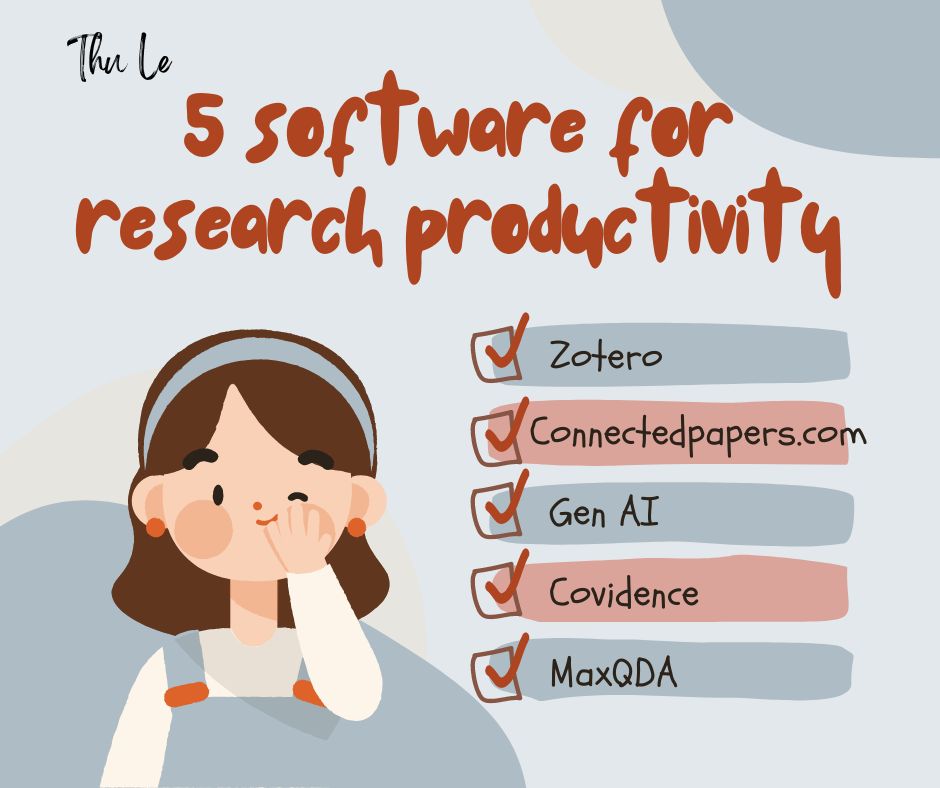In my last post, I shared my thoughts on using AI in research. One key takeaway is that AI should be used selectively, as a supportive tool to streamline and enhance the research process. Today, I want to share how I move from manual work to harnessing the power of AI in research with these five software/tools:
1. Zotero: Reference management software
Many of you might still be handling references manually—I've been there, and it worked fine until I realized that research is my daily work. References are an integral part of research, but it takes me too much time on the technical details. So I have decided to learn and turn to Zotero, which saves me time on finding, reviewing, and editing small citation details.
Zotero helps:
- Organize references neatly into project-specific folders
- Easily cite and format multiple references
- Sync and share references, especially in group projects
- Integrate with MS word so I can manage citations while writing without losing focus

- Ensure that no source is left out in both in-text citations and the reference list
The main con of Zotero is that it isn't flexible to correct details according to my chosen citation style since it pulls information directly from the web. For example, if the web capitalizes all the words in a title, I have to manually switch it to sentence case for APA 7th style.
2. Gen AI (ChatGPT, Claude)
When I finish writing but still feel unsure about the clarity, I ask Gen AI to "improve" the flow, though I always review the word choices to make sure they align with academic writing standards.
Gen AI is like a faster, more focused version of Google, so I usually ask it to check and verify fact information. For example, I ask it to suggest journals in my field that accept 10,000-word manuscripts. It provides a list, then I check each journal’s guidelines/scope/aims myself before making a decision.
I also use Gen AI to generate ideas. For instance, if a complex data section is hard to label, I ask AI for suggestions.

This website helps me find related papers by building a network map of connections between my search results and other papers.
How it benefits my research?
- Visualize the relationships between research papers
- Save time by providing direct links to related papers across platforms
- Suitable for various fields, unlike databases that focus on specific disciplines
- Find relevant studies that might not directly cite each other but share similar content
- Explore both older and newer research to gain a comprehensive view of my topic
The limitation is the number of searches allowed in a free account, so I only use this site:
after I’ve searched articles using databases or Google Scholar and identified a high-quality, relevant paper. I use this paper as a source to find a comprehensive connection with others. This ensures that the papers I explore are selectively cited and have strong relevance to my research.
4. Covidence:
Ideal for systematic reviews, this tool automates workflows, supports collaboration, and screens documents efficiently. The downside is the cost, but it's a must for anyone working on a systematic review in a team.
5. MaxQDA: Professional software for qualitative and mixed-method data analysis
Though it’s labeled as data analysis software, I use it for literature reviews as well. It is my go-to tool as it elevates my workflow fast and effectively, especially compared to doing everything manually! It resolves all issues I faced with manual literature reviews
It keeps everything—documents, my thoughts and reflections, notes, codes—on one platform, so organizing and managing material is seamless.
When it’s time to pull notes from my reading for an analysis and synthesis, MaxQDA’s search and retrieval functions are amazing.
It supports analyzing and comparing various types of data, like text, images, audio, and video, making it versatile.
![]() For me, MaxQDA has no real downside other than the cost of a license, but when you break it down, it's just a few dollars a day!
For me, MaxQDA has no real downside other than the cost of a license, but when you break it down, it's just a few dollars a day!
It is worth investing and transforming your research experience!!![]()
![]()
Thu Le - Lecturer
- 424 views




























